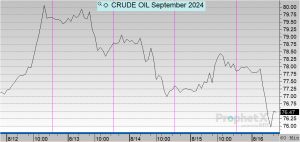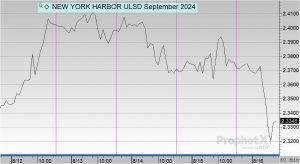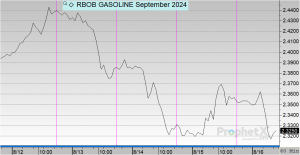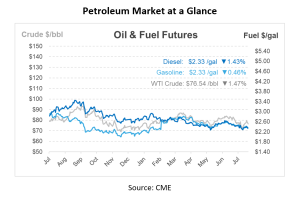
Week in Review: Crude Retreats as Jet Fuel Demand Wanes on Economic Uncertainty
In a volatile week for energy markets, crude oil prices reversed earlier gains, retreating by $2 at one point this morning as concerns over broader economic uncertainty weighed heavily on the market. Yesterday, crude oil and refined product contracts ended a two-day decline, with gasoline contracts increasing by approximately 1.5%. The spike in petroleum contracts was driven by ongoing Middle East tensions and economic data showing a larger-than-expected increase in consumer spending. Earlier in the week, energy prices were pressured by profit-taking and concerns over market oversupply as OPEC and its allies began to reduce production cuts. However, July’s mild inflation data and strong consumer spending encouraged bargain-hunting on Thursday. The Commerce Department reported that advanced retail sales in July rose by 1%, exceeding economists’ expectations.
The Department of Energy (DOE) has awarded contracts totaling $111.46 million to purchase 1.5 million barrels of sour crude for delivery in January to Louisiana’s Bayou Choctaw storage site. They have also increased the crude purchase request for the Bryan Mound site in Texas, now seeking 6 million barrels for delivery between January and March, up from the initial request of 2 million barrels. The DOE set a price cap of $79.99/bbl for these purchases but secured the crude for the Bayou Choctaw site at an average price of $74.31/bbl, below the cap.
These purchases are part of ongoing efforts to replenish the Strategic Petroleum Reserve (SPR), which currently holds 376.5 million barrels of crude, still significantly below its level of 656.1 million barrels in July 2020. The DOE has awarded contracts for nearly 45 million barrels at an average price of $77/bbl. The agency also worked with Congress to cancel 140 million barrels of previously mandated sales from the reserve.
Global jet fuel demand is expected to decline as a slowdown in consumer spending impacts travel budgets, potentially affecting oil prices in the coming months. Despite an initial increase in jet fuel demand this year, weaker-than-expected economic activity, particularly in the U.S. and China, casts doubt on further growth. Jet fuel, which accounts for about 7% of global oil demand, was anticipated to be a key driver of growth as travel rebounded from the pandemic. However, recent concerns about reduced consumer spending and a cooling economy will likely limit gains in jet fuel demand.
Major airline operators and travel companies have expressed concerns over slowing consumer spending, affecting leisure travel. U.S. consumer spending growth has been sluggish, with only a 0.3% increase in the three months through June, the slowest in over a year.
Long-term factors, such as improved fuel efficiency in newer aircraft and shifts in consumer behavior toward shorter domestic flights, also contribute to the reduced demand for jet fuel. Additionally, geopolitical tensions, like trade wars between the U.S. and China and restrictions on Russian international travel, have further dampened demand. While jet fuel demand is still expected to grow, these challenges and efficiency improvements may pose risks to the year’s oil demand and price forecasts.
Prices in Review
Crude opened on Monday at $76.99, jumped nearly $3/bbl on Tuesday, nearing the $80/bbl range, and fell back off the rest of the week. With an initial $2/bbl drop this morning, crude opened at $78.16, an overall increase of $1.17 or 1.5%.

Diesel opened the week at $2.3423, traded up slightly on Tuesday, and fell for the rest of the week. This morning, diesel opened at $2.3773, an increase of 3 cents or 1.5%.

Gasoline opened the week at $2.3972, increased by about 4 cents on Tuesday, and tapered off the rest of the week. This morning, gasoline opened at $2.3557, a decrease of 4 cents or -1.7%.


This article is part of Daily Market News & Insights
Tagged:
MARKET CONDITION REPORT - DISCLAIMER
The information contained herein is derived from sources believed to be reliable; however, this information is not guaranteed as to its accuracy or completeness. Furthermore, no responsibility is assumed for use of this material and no express or implied warranties or guarantees are made. This material and any view or comment expressed herein are provided for informational purposes only and should not be construed in any way as an inducement or recommendation to buy or sell products, commodity futures or options contracts.





